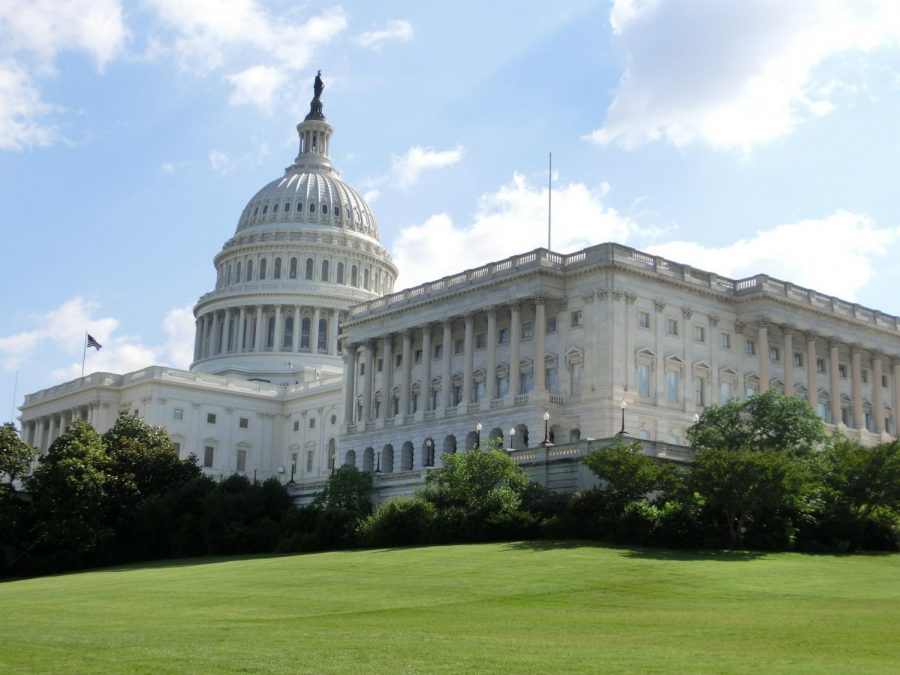Washington Reaches Deal on Historic Stimulus Package
Jens Junge
The United States Capitol is located in Washington, D.C. Photo courtesy of Jens Junge from Pixabay
March 26, 2020
The past few days have been a frenzy in Washington as members of the US Senate and House have negotiated a nearly $2 trillion stimulus package bill to help with the nation’s damaged economic state due to the coronavirus. The Republican sponsored bill has failed to advance repeatedly on Sunday and Monday, as Senate Democrats opposed several key portions.
The cause for failure of the bill’s advancement was due to key policy disagreements between the two parties on elements of the package. A major point of discontent for Senate Democrats was that the bill gives $500 billion in corporate loan funds. This was a sticking point for Democrats because there were no restrictions on how the money from the loans may be spent.
“[The bailout fund is] a giant, giant corporate bailout fund with no accountability,” Senate Minority Leader Chuck Schumer said while speaking on the Senate floor Tuesday. “What we have seen is a cutback in what we asked for, for hospitals, doctors, nurses, masks, equipment. We need more money than the Republican majority proposed.”
On the other side of the political aisle, there were Republican senators placing blame on the Democrats, accusing them of holding up relief for this crisis. This included some Texas Republicans.
“It seemed like we were making good progress,” Senate Majority Whip John Cornyn said in an interview on CSPAN. “There had been negotiating between the parties [and] compromising. As of Sunday morning, it looked like we were just about [to reach a deal]. Then the Speaker of the House and the Minority Leader of the Senate decided the crisis should not be wasted. They claimed all of a sudden the deal was not good enough.”
Other points of disagreement for Democrats included that the bill excluded many Americans from individual bailouts, lacked aid for food stamp recipients, and didn’t offer help for those without insurance, among other criticisms.
On Monday, Speaker of the House Nancy Pelosi (D- NY) proposed her own $2.5 trillion bill. The proposal included aid for small businesses and schools as well as many other provisions. The bill gave her party leverage in negotiations as it broadened the Democrats’ options.
With Republicans requiring 60 votes for the bill to pass and 5 Republican senators in quarantine, Democratic support for the bill was critical. On Sunday the vote was 47-47, and on Monday it was 49-47. There was progress with the negotiations, giving hope to some senators.
“We [Democrats] think the bill has moved sufficiently to the side of workers,” Ms. Pelosi said in a press conference. “Thanks to the unity and insistence of Senate and House Democrats, the bill has moved a great deal closer to America’s workers.”
The negotiations yielded changes that gave low-income individuals more money and added oversight by an inspector general and congressional panel for the corporate loan. Finally, at around 1:00 A.M. on Wednesday, a deal was reached on the bill.
The current draft of the bill includes $500 billion in loans, with $4 billion for cargo airlines, $17 billion for national security businesses, and $25 billion for passenger air carriers. The rest of the allotted money for loans goes to states and other business areas. There are also regulations included with the loans provided to businesses. The bill draft gives $88 million to the government volunteer program, Peace Corps, $95 million to USAID, $258 million for international disaster aid, and $324 million for diplomacy efforts.
The draft of the package doesn’t just provide money for businesses. It will also suspend student loan payments, direct money towards individuals, protect against evictions and has many more provisions.
The bill, while it had shown progress, quickly reached a snag in its path on Wednesday. This was due to many last-minute changes requested. However, despite its struggles, the bill passed on Wednesday night and will now be sent to the House. The House will vote on the measure Friday and is expected to pass.




Sriiiilekha • Mar 26, 2020 at 12:24 pm
I live for Shawkin’s writing.